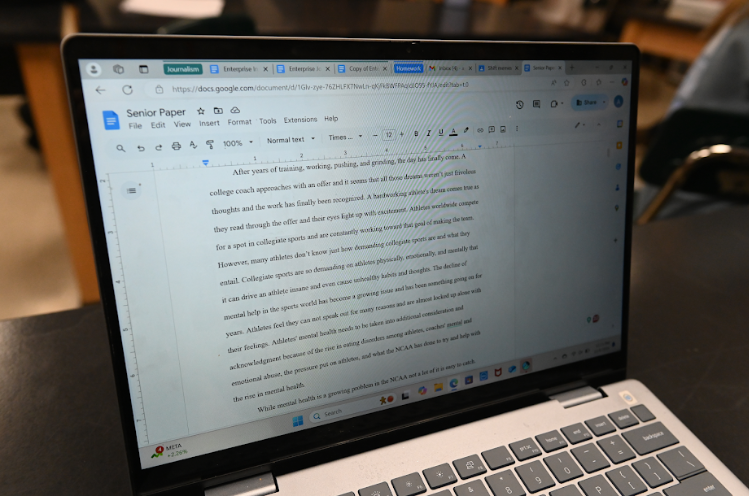With the popularity of journalism classes increasing throughout Idaho, students are finding their freedoms more constrained in an age where information flows freely.
Idaho’s state laws and policies on student journalism reflect a delicate balancing act between students’ First Amendment rights and administrative oversight. While some see these laws as completely necessary, others argue that the state’s stance skews too far toward control, stifling the young voices and reducing critical thinking.
As student journalists and supportive administrators push through efforts like the New Voices campaign and Student Press Law Center, the struggle to protect their freedom to press in schools has intensified, drawing on landmark legal precedents and grassroots advocacy.
Idaho’s policies allow school administrations to exercise significant control over student publication.
For example, the Lakeland School district directly states in their board policy, “Material appearing in such publications should reflect all areas of student interest, including topics about which there may be controversy and dissent. Controversial issues may be presented, provided they are treated in depth and represent a variety of viewpoints. Such materials may not be libelous, obscene, or profane, nor may they cause a substantial disruption of the school, invade the privacy rights of others, demean any race, religion, gender, or ethnic group, or advocate the violation of the law. They may not advertise tobacco, liquor, illicit drugs, or drug paraphernalia.”
Under these rules, principals and school officials can censor stories they deem inappropriate or controversial for the school’s reputation.
While these policies may seem fair, some schools may take censoring “too far.”
In my opinion, students do not feel they have the freedom to write about what they want or cover the more controversial topics for fear of repercussions from the school board. The controversial topics are what get a certain view out to others and are a hit in the press.
“I do not ask to write about controversial topics that I know would be shot down because I don’t see a point. I also noticed this creates a big tension between the class and admin. The times I have written about controversial topics, I notice that it’s almost a burden regardless of whether or not it was a strongly written or well-researched topic.” Lakeland Hawkeye’s news writer Audrey Halgren said.
Little do most know that these policies go back to 1988 in the Hazelwood School District v. Kuhlmeier case.
In this case, the court ruled 5-3 that administrators could censor school-sponsored publications if their actions were “reasonably related to legitimate pedagogical concerns.”
The decision overturned Tinker v. Des Moines Independent Community School District (1969), which upheld students’ rights to freely express their ideas. The decision famously declared, “Students do not shed their constitutional rights to freedom of speech or expression at the schoolhouse gate.”
While Tinker had established high standards for restricting student speech by requiring proof of substantial disruption, Hazelwood gave schools broader discretion over content. This empowered Idaho administrators to censor student journalism and media while maintaining school order.
“The most common obstacle for writers, specifically students, is the guilt that if they write something not pleasing to the common audience, that it will bring down not only their name but the schools as well,” Halgren said.
Student reporters across Idaho have faced constant challenges in tackling sensitive topics. A few of these issues have been seen in Lakeland High School itself. While most students do not have an issue with what they want to write, there are a few stories that students are afraid to bring up because of the controversy.
“I have wanted to write about Idaho being the 50th lowest state for school funding, but I have not,” Halgren said.
The climate of self-censorship is pervasive, with many student journalists avoiding controversial topics in general. While this may seem like a better idea, I personally believe that it takes away the efforts of trying to use the creative mind. Controversial topics get students to think and make better writers because of everything they need to avoid. While a topic can be controversial, it does not mean it has to be biased. Taking in the other key points from the opposing side is what gets the students to think and dig deeper.
“At Lakeland, we do our best to avoid bias when writing news articles; of course, we don’t talk about material that is not school-appropriate, and our articles need to relate in some way to the Lakeland community,” Current Lakeland Hawkeye Editor-In-Chief Alyssa Caywood said.
In response to these restrictions, a few students and educators have turned to the New Voices movement, a national campaign advocating for state laws to restore students’ First Amendment rights to the press.
The movement advocates passing legislation ensuring that student journalists are free to report on issues of public concern without fear of administrative censorship, as long as their work does not violate the law or disrupt school operations.
The last bill proposed in Idaho was drafted in 2020 but did not pass.
In order for this to be passed, New Voices has model legislation and asks for it to be brought to Idaho.
Then, there is a need to figure out what state legislators will be supportive of. It also takes a lot of journalists to introduce a bill and sponsor it to make it into law, having to testify in front of certain committees.
Lastly, people from different organizations, including New Voices, show up, and the governor needs to sign it into law.
“I do think there are certain things that the public should be informed about regardless of being a possibly controversial topic, and in that case, I think it is important that the story is written in a way that informs the public in an unbiased manner,” Caywood said.
Advocates such as journalist students, teachers, and even some administration hope that Idaho will follow suit of other states like Oregon and Washington, emphasizing that a free press is essential to civic engagement.
Despite its grassroots support, the New Voices bill has faced opposition from school administrators and lawmakers who argue it could undermine school authority.
Critics also cite liability concerns, fearing that the school could be held responsible for defamatory or harmful content published in student newspapers.
“There have been numerous times where certain ideas of mine have raised questions. However, the best way to handle that is to switch the angle of the story and see if there is a less controversial angle,” Former Hawkeye Editor-in-Chief Samantha Fuller said.
Proponents counter that existing laws on libel and slander already apply to these student journalists, which makes such fears unwarranted.
Eighteen out of the fifty states have laws protecting student journalists’ First Amendment rights.
The debate in Idaho underscores the broader tension between authority and autonomy in education. While schools are interested in maintaining a safe environment, overly restrictive policies can risk depriving students of crucial learning experiences and true potential.
“Although reporting is about telling the truth, it is not about making enemies with every person you speak to. Journalists should keep their information factional, write about topics that are relevant to the public, and tell the whole story,” Fuller said.
The New Voices movement draws heavily on the principles established in Tinker, and advocates argue that the ruling’s emphasis on protecting student expression should take precedence over Hazlewood. While the Supreme Court has not revisited the issue, some lower courts have limited Hazelwood, mostly in cases involving independent or extracurricular student media.
This issue has been seen more recently for students at Lakeland High School over the last few years. While this does not happen as often as it sounds, it is still hard when a student is flowing with creative ideas or trying to inform people on a topic, and articles are not allowed to be “too controversial.”
“There are some restrictions we have to follow, which can make it difficult to cover certain topics that may be more controversial. We must be especially careful because we risk losing the privilege of having our school newspaper if the board does not like our story,” Caywood said.
I have had articles that I could not write about because the topic might cause a ruckus in the district.
I understand these laws to an extent, but I also feel that when power is taken too far, it can diminish a student’s creativity. Most join a journalism class to write on topics they feel are important or that they are passionate about. To take that away from them is almost like taking away their potential to improve and shine.
While some topics should stay off school media or websites, others are not as bad as long as they do not harm the school’s learning.
Restricting or censoring certain things for fear of administration is difficult, and students should not have to do so.
While fighting for student journalists’ rights may be a long road, that does not mean it is not worth the battle.

